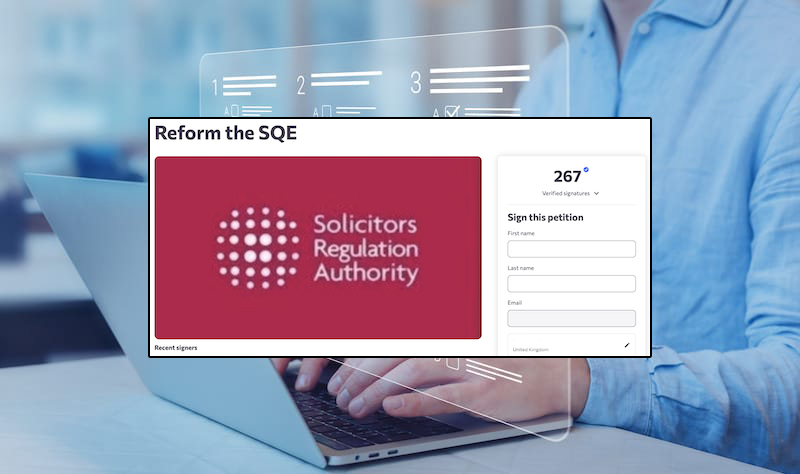New training regime slammed by TC holder

An individual claiming to be a future trainee solicitor has launched a public campaign calling for reform of the Solicitors Qualifying Examination (SQE), citing the “severe toll” it has taken on her mental, financial and physical wellbeing.
Using the name ‘Hannah Cox’, which she’s since stated is an alias, the petitioner raises several key concerns, including what she describes as the “opaque nature” of SQE administration, particularly the SRA’s delay in publishing individual exam providers’ pass rates. This lack of transparency has, she argues, eroded trust among aspiring lawyers and is further compounded by reports of inaccurate exam results and an inadequate appeals process.
“The SQE is not fit for purpose,” states the petition, which has attracted over 260 signatures. It highlights concerns that elements of the exam may discriminate against candidates from diverse backgrounds and with different learning styles. This, she says, poses a threat to the diversity of the legal profession and risks excluding valuable perspectives that “enrich legal practice”.
The petition also addresses concerns about the SQE’s impact on students’ mental health. “The pressure and uncertainty surrounding the SQE is damaging, with many candidates enduring extreme stress and anxiety,” she writes. This mental toll is an “unacceptable consequence” of an exam meant to broaden access to the profession.
The future trainee continues:
“Despite being academically very strong, with a law degree from a top university and a training contract with an international firm, I have found the SQE disproportionately challenging. It has not only affected my academic life but has also taken a severe toll on my mental, financial, and physical well-being. This is a sentiment echoed by the vast majority of other candidates who have undertaken this exam.”
“Future legal professionals deserve a fair and equitable path to qualification,” she continues, calling on the Solicitors Regulation Authority (SRA) to improve transparency and conduct a thorough review of the SQE’s content and structure. She argues that the exam should accurately assess a candidate’s capability without placing undue strain on their mental and physical health.
Since its introduction in 2021, the SQE has not delivered the smooth rollout the SRA had hoped for. Legal Cheek has previously reported a range of issues, including IT failures at test centres, long online queues to book exam slots, and what is arguably the most serious error to date — a calculation blunder that wrongly informed 175 students they had failed SQE1.
An SRA spokesperson said: “We understand that candidates can find the SQE challenging, both to prepare for and sit. It is a demanding, high stakes assessment that gives successful candidates access to a licence to practise.”
They continued:
“The questions are written by a pool of solicitors reflecting what is expected of a newly qualified solicitor and the pass mark is determined using well-established methods. The SQE’s independent reviewer has confirmed it’s a robust and fair assessment. Many candidates have now passed the SQE. Pass rates and statistical information about candidates are published after each sitting. Differential outcomes by ethnicity are widely seen in legal professional exams, in other sectors and at different stages of education. Informed by research commissioned from the University of Exeter, we are taking action to address the causes of such differential outcomes that are within our influence.”


